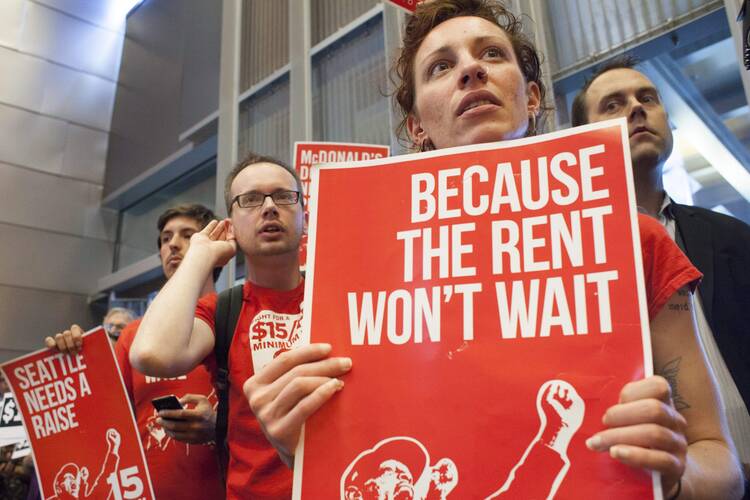While Congress has stalled on adopting an increase in the federal minimum wage, steps are being taken across the country to boost the income of low-wage workers. From Massachusetts and Vermont to Seattle and San Francisco, state legislators and city councils have either acted on or are negotiating minimum wage hikes. Despite concern from opponents to any wage increase, most legislators have come to see that the likely benefit to workers outweighs the cost to businesses.
President Barack Obama, not waiting for Congress to act, followed through on his February executive order by announcing on June 12 rules for raising the wages of workers under federal contracts to a minimum of $10.10 per hour. The higher wage level for about 250,000 employees takes effect in January. Meanwhile, a new report from Oxfam America called for Congress to end the gridlock and adopt an increase in the federal minimum wage from $7.25 per hour to $10.10 per hour with an index to inflation.
On average, about 40,000 low-wage workers in each congressional district across the country would benefit if the minimum wage were increased, said Raymond C. Offenheiser, president of Oxfam America during a teleconference to release the report. "If you believe in stimulation of growth in the local economy and becoming attractive to local investors in your district, then you'd be supportive of this," Offenheiser said.
In advocating for the hike, the Oxfam report estimated that if the minimum wage were adjusted to align with historic values, it would be "well over $10."
The legislative actions and new round of advocacy come with one basic message: Anyone who works full time should not live in poverty.
Opponents of minimum wage measures have said a wage increase would cost jobs and reduce any growth the U.S. economy is experiencing.
At the current federal minimum wage, a worker receives $15,080 annually. For 2014, the federal poverty guideline for a family of three is $19,790. That predicament for low-wage workers led Archbishop Thomas G. Wenski of Miami, chairman of the U.S. bishops' Committee on Domestic Justice and Human Development, to repeatedly call for federal minimum wage hike. In a Jan. 8 letter to the U.S. Senate, Archbishop Wenski and Father Larry Snyder, president of Catholic Charities USA, endorsed legislation raising the minimum wage.
"The current federal minimum wage falls short ... for its failure to provide sufficient resources for individuals to form and support families. ... Workers deserve a just wage that allows them to live in dignity, form and support families and contribute to the common good," the letter said.
In looking at the federal poverty guidelines and seeing the inaction at the federal level, legislators in some communities have decided to act.
In Seattle, the City Council passed a law in that would gradually raise the minimum wage to $15 per hour over the next few years with an index for inflation. San Francisco is considering legislation that would raise the minimum wage to $15 per hour by 2018. In Massachusetts, both houses of the Legislature agreed to raise the wage from $8 per hour to $11 per hour. And Vermont Gov. Peter Shumlin signed a bill June 9 that calls for the minimum wage to rise to $10.50 per hour by 2018 and be indexed to inflation thereafter.
In Rhode Island, however, the Democratic-controlled state Legislature voted to prohibit municipalities from enacting any minimum wage measure even as the Providence city council is considering an ordinance that would raise the minimum wage to $15 per hour for employees at large hotels.
Even at $15 an hour, a full-time worker would make a bit more than $30,000 annually. While that may be sufficient in Des Moines, Iowa, in more expensive enclaves such as Seattle, San Francisco or Boston, families still will be faced with tight budgets as they deal with the overall high cost of living.
During the Oxfam teleconference, Father Snyder cited the moral questions facing the country and the quality of life of low-wage workers. "We support increasing the minimum wage because it is the right thing to do and more importantly it is the just thing to do," Father Snyder explained.
"People who work fulltime should not have to live in poverty," he said, noting that at Catholic Charities agencies across the country working people receive assistance with food, rent, utility payments and other necessities.
"They contribute to the nation's current economic prosperity yet many of them live at or below the poverty line," Father Snyder told listeners.
Echoing Father Snyder, Sherry Stewart Deutschmann, CEO of LetterLogic, a 12-year-old mail services company in Nashville, Tennessee, said she believes paying a living wage is better for business and her employees. New employees at the company start at $14 per hour and Deutschmann said she has a profit-sharing plan in place and offers a generous benefits package that includes fully paid health insurance and tuition reimbursement.
"As a small-business owner, I never understood the logic and other business owners arguing against increasing the minimum wage. Increasing the minimum wage is better for business," Deutschmann explained. "I knew I could not have quality service if [employees] are thinking the lights might not be on when they got home or they could not pay the rent," she said.
With the November election looming and Republicans hoping to gain control of the Senate, the chances of any major piece of legislation—such as a minimum wage bill—passing is practically nil. Under such a scenario, any further movement on minimum wage measures will be at the state and municipal level. At that level, it will be up to state Catholic conferences to weigh in.








